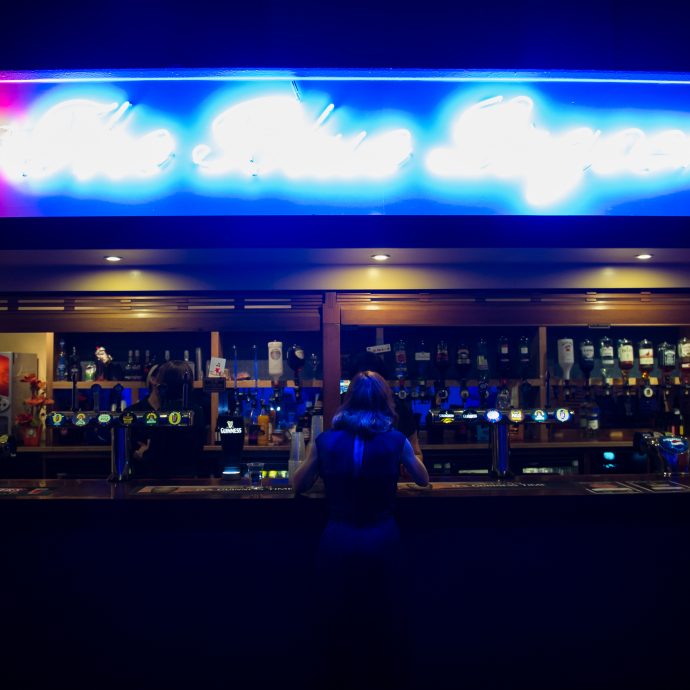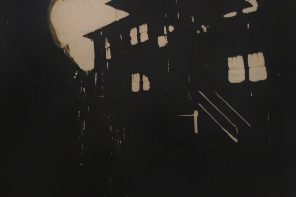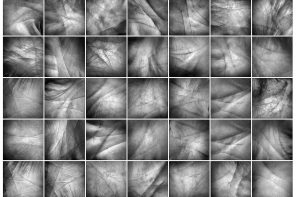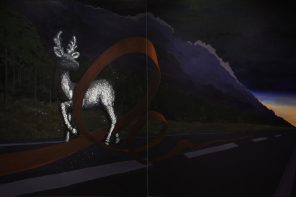I was in bed reading Leopardi on vastness, a subject that since a little after one a.m. had overwhelmed me, like a cascade overwhelms a leaf. I enter a room with no borders, no columns, no end. With a sideways glance, whose cause and intent I do not understand, I enter this room through the door of a book, a book’s edge. Is this an anticipatory pleasure I feel or am I plummeting helplessly into an abyss? Since mid-December I have not been well.
“Vastness alone,” I read, “arouses a sense of pleasure in the mind, no matter what physical or moral sensation it comes from, or through which of the five senses” (Zibaldone). But for me that first step into the void, of which there is nothing vaster, is anything but pleasurable. Nor do I find delight in it, as would have Burke, who saw unmanifested terror as anticipatory delight. Sublime passions, according to Burke, “turn on pain and danger. They are simply painful when their causes immediately affect us. They are delightful when we have an idea of pain or danger without being actually in such circumstances. This delight I have not called pleasure because it is different enough from any idea of positive pleasure. Whatever excites this delight, I call sublime.” At one point his distinguishing sublime delight from positive pleasure made perfect sense to me, but tonight it seemed irrefutable that Burke was madder by far than I. Surely, I thought, at base Burke was not so abject as to not understand the power of the negative sublime, that ideas themselves effect us as actualities.
A pale, snow-inflected light glowed through the window of the other room where she once stayed. I resisted checking my email.
No doubt I was completely misreading both Burke and Leopardi. I hadn’t read the former in decades, would not live long enough to finish the latter’s Zibaldone, its 2500 bible-thin, narrow-margined pages, and knew at this precise moment my mind could become unhinged in ways no one, least of all myself, could fathom or repair.
I switched off my reading lamp, stretched out naked on my sheets, in the mottled dark, sweating. Propped on a chair at the foot of the bed a small fan at its lowest setting hummed and whirled. No, I thought, it wasn’t me who had a mid-winter fever. I had no fever, the world had a fever, and what burned within it now burned within me.
Over the fan, over the night rustle outside my open window, I screamed: “As if I had a fever!”
For a moment everything was still—the fan, the night, my breath, the music I’d left on in the other room. Where am I now? I asked my shelves, whose response, as ever, was silence.
Instinctually I sniffed the garlic on my fingers, acquired from this evening’s dinner preparation—tofu, soy sauce, onion, fresh garlic, broccoli, bell pepper, tomatoes, salt, pepper, olive oil, a cup of basmati—and again the hum of the fan, its wind over my hot, damp body, the scurrilous scratching of some animal against the bark of the fir tree just beyond my window.
No doubt I was completely misreading both Burke and Leopardi. I wouldn’t live long enough to finish the latter’s Zibaldone and hadn’t read the former since I was in college. No doubt at the basest level I was misreading Burke. Any blind man could see that. But then I thought: No, not me the mad one. Had I been mad I would have been pulling my ears out by the roots rather than listening to Cecil Taylor, his bursting layered chords like the sound of continents collapsing. I coughed, coughed again, and suddenly turned over, wracked by coughing to bring up some speck stuck deep in my throat which was never the last, and then a burst of red suffused my head and eyes and I collapsed face-down on the bed and lay there until my heart stopped pounding.
A moment later I was wondering if the problem wasn’t that Leopardi and Burke lacked the imagination and common sense to experience vastness as imminent, annihilating, abject terror. Not that I want to make a study of it, I thought, alone in the vast comprehending dark. No, no, I’m maligning a man who by the time he was twenty-five had already composed his Philosophical Enquiry into the Origin of Our Ideas of the Sublime and Beautiful. Surely, I thought, it wasn’t Burke but I who was mad.
I rolled over to the edge of the bed to check my email. The screen bathed me in its blue light that showed nothing.
“Am I simply stupid or what?” I shouted into the room. At which point a shudder wracked me to my bones, and I hugged myself tight until I stopped coughing and trembling. My mouth was dry, sour, but I didn’t want to get up, I wanted to be calm and rational.
For Leopardi, I reasoned, “vague sensations,” even if derived from concrete objects, are indefinite, thus infinite. The note in Zibaldone regarding Leopardi’s delight in vastness quotes Burke’s Philosophical Enquiry: “Greatness of dimension is a powerful cause of the sublime.” Burke’s distinction between the sublime and beauty, it seems to me, says the sublime offers terror only as abstraction, as thrilling tease. Behind the mountains there are other mountains we cannot see, and behind these mountains etc.
In no sense do I find this comforting, or a delightful surprise, or sourced from a moral sensation, no more than I do the landscapes of Caspar David Friedrich, considered a lunatic by many of his contemporaries, his paintings soaked in narcotic vapors (Ramdohr).
“Ha,” I said into the room, closed my computer onto silence again, flung off the covers, shakily got out of bed and padded in my bare feet across the moon-blanched parquet into the kitchen, my feet flush against its cooling tiles.
The next moment—or several moments later, I couldn’t tell which—I was looking at my hand lit by a strange green light coming from the open refrigerator, as if it weren’t my hand, as if it did not belong to me. But if not mine, then whose?
“Not Leopardi’s,” I blurted out with a laugh, closed the door (vaguely I recall having considered partaking of last night’s leftovers, a ragout likely already to have gone dicey), then weaved back to the bedroom.
“Ha, Leopardi talking through his hat,” I said and then quickly spun about, as if to make my thoughts run faster.
Yes, I thought, stroking the spine of Zilbaldone, I must be mad to have thought Leopardi madder than I, despite his depression, a condition I do not suffer, or only on occasion, and never yet to the suicidal extent of a Leopardi, but nonetheless I was the more mad.
I checked my mail again. Nothing. In my last email, for no reason other than haste and the assumption of shared understanding, I had said nothing of importance regarding anything, nor had I asked about the recipient’s state of mind, as she had asked me nothing about my state of mind, which in any case I had no intention of sharing. Thank god we hadn’t asked each other about our respective states of mind, I thought. Had I told her my state of mind, I thought, she would surely, in ways previously unknown to her and the world, have found me insane.
Again I laughed out loud into the empty room and gripped the counterpane, astonished all at once to find myself back in bed under the covers.
Above me the red light of the smoke detector I had installed a few months ago pulsed on, then off, as it would continue to do at 90-second intervals, if the warranty held, for the next twelve to twenty years.
Tom Whalen’s books include The President in Her Towers, The Straw That Broke, Elongated Figures, Dolls, and most recently a translation of Robert Walser’s Girlfriends, Ghosts, and Other Stories (New York Review Books Classics). His fiction, poetry, essays, and translations have appeared in Agni, Bookforum, Film Quarterly, Georgia Review, Harper’s (online), The Hopkins Review, The Iowa Review, The Literary Review, The Paris Review and elsewhere. He lives in Stuttgart, Germany.




